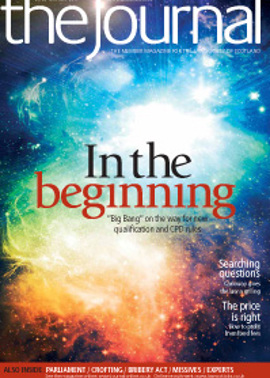Holyrood: a verdict

When the members of the Scottish Parliament left Holyrood in March – some temporarily, others permanently – and preparations for the elections in May got underway, the Parliament had completed its third term. What has it achieved over those three sessions?
It has moved from temporary accommodation into its permanent home: a home viewed by some as an architectural masterpiece and by others as a blot on the landscape. The unanimous view was that the building had been expensive, but objections on that score have faded – and recently have been overshadowed by the Edinburgh trams debacle. Members of the Scottish Parliament sorted out the business of their own expenses and emerged with rather less ignominy than their colleagues at Westminster. The political fortunes of some soared, while those of others crashed and burned. As the dominant political party changed, the administration rebranded itself. The “Scottish Executive” of the early Labour/Liberal Democrat years was replaced by the “Scottish Government” of the minority Scottish Nationalist administration. Much of this is the usual stuff of politics, wherever the legislature is located.
A legislature that would be different
But this Parliament was supposed to be different. There was a lot riding on the creation of the Scottish Parliament under the Scotland Act 1998, although the precise aspirations were – and remain – as varied as the political opinions of the population. The sense of reaffirmation of national identity was captured by Dr Winnie Ewing, the Parliament’s most senior member, at its first meeting in May 1999 when she declared that “The Scottish Parliament, which adjourned on 25 March 1707, is hereby reconvened”. Of course, this modern Parliament is a very different constitutional animal from its predecessor. No matter. This was the beginning of an exciting new political era for Scotland.
Time for an assessment
As the 10th anniversary of the Scottish Parliament in 2009 approached, a group of academics at Stirling Law School concluded that it was time to offer the first critical analysis of the Parliament’s contribution to law making in a number of key areas, and to put this contribution into its wider policy and socio-legal context. There was something delightfully symmetrical about Scotland’s newest law school undertaking the task in respect of this new legislature. A new and still comparatively small law school could not undertake the task alone, but then the Scottish Parliament does not operate in isolation. Fortunately, Scotland has a wealth of talent amongst its legal academics and practitioners.
Approaches were made and each individual who accepted the challenge was asked to pass judgment on the progress made by legislators in his or her field of expertise. Contributors were invited to subject the key legislative themes in their own areas to rigorous critical analysis and also, in this context, to consider whether the Parliament has achieved what had been hoped for when it was established by the Scotland Act. The result is Law Making and the Scottish Parliament: The Early Years, newly published by Edinburgh University Press.
Given the wide variety of political and other opinion of the contributors themselves and the wide range of legislative efforts on which they commented, a degree of caution is called for in drawing general conclusions from the volume. However, it was striking that the overall verdict was one of optimism tempered by experience.
Much legislating but few pyrotechnics
In their first 10 years, the members of the Scottish Parliament demonstrated immense industry, leading to a great deal more legislation being passed by the Parliament than was envisaged originally. On the other hand, there has been relatively little in the way of the legislative pyrotechnics that were anticipated by some when the Parliament first sat in its temporary lodgings on the Mound in Edinburgh in May 1999. But perhaps neither of these features is surprising.
Neither the preceding campaign for a Scottish Parliament nor the Labour Government’s 1997 white paper on Scottish devolution promised sweeping legal reform. Rather, they were premised on the political and social need for Scotland to have a legislature to rectify the so-called “democratic deficit” which had become apparent during the 1980s and 1990s, when UK Conservative Governments were in power with little parliamentary representation from Scotland.
A fundamental problem pre-devolution had been finding the time at Westminster to pass legislation for Scotland. There were important technical aspects of Scots private law, like heritable property, that were in need of modernisation and more thorough consideration than the Westminster timetable had allowed. It is in this context that the Parliament may have done most in achieving its goals.
On the other hand, even the most vociferous advocates for the creation of the Scottish Parliament had never claimed that all of the law in Scotland was in need of wholesale, radical reform. Devolution was not a legal “year zero”, and the new Scottish Parliament inherited a body of developed statutory provision from Westminster which was neither appreciably better nor worse than that which had been enacted for the rest of the UK. Indeed, some fields, like the law of evidence and the structure of local government, had received significant attention from Westminster, and the Scottish Parliament’s legislative contribution was largely a continuation of what had gone before.
In addition, although there were important technical aspects of Scots private law that were in need of modernisation and more thorough consideration than the Westminster timetable had allowed, there was little in terms of the actual substance of the law that the general public would have thought to be monstrously unjust or otherwise seriously objectionable.
Effective and competent legislators
In many respects, MSPs have proved themselves to be effective and competent law makers, enacting often weighty and complex legislation in a wide range of areas. A number of the contributors to Law Making and the Scottish Parliament express admiration for the Parliament’s legislative skill and respect for its achievements. In particular, the legislation on arbitration, charities, heritable property law and reform of the judiciary reflects well debated, thoughtful and careful technical revision that has significantly improved legal provision for Scotland. In the field of transport, Scotland’s legislators demonstrated that they were not afraid to review and change the ways in which they legislate in the light of experience.
Some disappointments
One hope for the Scottish Parliament was that it would be more accessible, open and responsive than Westminster, allowing for greater public participation in the law-making process. While there has been wide consultation on many aspects of legislative reform, the public petitions procedure has failed to live up to expectations, sometimes because the proposals contained in the petitions were so partisan or flawed.
Further, it is arguable that, although the structure of the Parliament is distinctive and aspects of its procedure are more open and inclusive than the Westminster equivalent, the executive dominates the legislative process as much as it does in London.
It is also the case that politically controversial measures, like recognition of same-sex relationships, have all too often been passed to Westminster under legislative consent procedures, in what amounts to a failure of political leadership.
In the juvenile justice arena, while the Labour/Liberal Democrat coalition indulged in punitive youth crime rhetoric, in contrast to the SNP administration’s emphasis on welfare issues, neither Government has actually legislated very much in the field. In the context of Scotland’s culture, when the Parliament has engaged with particular issues in legislation it has often achieved much, but the leadership and overall vision of the Scottish political class have been disappointing.
The view that there has been a somewhat passive and even supine approach to law making by MSPs is shared by a number of contributors, including some trenchant criticisms of the Parliament’s failure to monitor and challenge the Scottish Government in the area of human rights.
In other areas, like criminal law and legislation on the environment, education and housing, while there has been a glut of law-making over the past 10 years, reform has been implemented in a largely piecemeal, fragmented fashion. In this too, the Parliament would seem to have followed in Westminster’s ad hoc footsteps.
A week may be a long time in politics, but 10 years is a very short time in the life of a parliament. The next chapter is being written, not only by the voters of Scotland, but in the form of the Scotland Bill.
Elaine E Sutherland is Professor of Child and Family Law, Stirling Law School, University of Stirling (elaine.sutherland@stir.ac.uk), and Professor of Law, Lewis and Clark Law School, Portland, Oregon (es@lclark.edu).
This article draws on the editors’ introductory chapter in E E Sutherland, K E Goodall, G F M Little and F P Davidson (eds), Law Making and the Scottish Parliament: The Early Years (Edinburgh, Edinburgh University Press, 2011). The author is most grateful to Edinburgh University Press, the Edinburgh Law Review Trust and her fellow editors for permission to reproduce parts of the chapter. However, this article does not replicate the chapter and the usual caveat applies. Any opinions expressed are those of the author and do not necessarily reflect those of any other person or body.
The book is reviewed at p50 of this issue.
In this issue
- Experience not to be missed
- Call in the experts
- Planning to deliver
- Stars of the future
- Registered Paralegal Scheme hits the mark
- CPD: a personal quest
- Wha's like us?
- Holyrood: a verdict
- Public ethos
- Power in name only?
- From the Brussels office
- Minority voices
- Law reform update
- Quinn Direct - when to intimate?
- Name your price
- Ask Ash
- Communication breakdown - a major risk issue
- Interested parties
- Support from afar
- Plus ça change?
- Where the state has to stop
- A NEST egg?
- Scottish Solicitors' Discipline Tribunal
- Website review
- Book reviews
- Above board
- Ruaig an Fhèidh
- The price of breach






